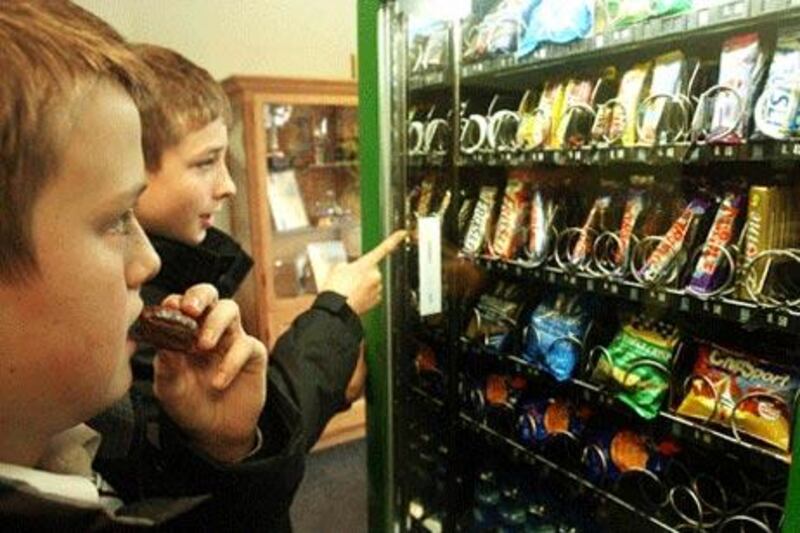I have turned into a stroppy mother. It's official. Playground parent chit-chat last week led me to discover that our kids' "healthy breakfast club" at school offers happy-to-oblige children with a hefty dose of fresh white sugar to put on top of their already sugary cereal. I am not the first parent to think about storming the school kitchen. A surge of UK parents became fired up by the high-profile School Dinners campaign led by the TV chef and agitator for better eating Jamie Oliver. It made waves all the way to Tony Blair at Downing Street and made a national joke of the reviled deep-fried Turkey Twizzler.
My first taste of a sugar-coated education was when I attended an American university for a year. It was standard practice on campus and in classrooms to have junk food-filled vending machines and sponsorship from companies wanting to gain customer loyalty through campus exposure. Set up as a win-win financial arrangement whereby schools gain sponsorship funds from the junk food companies and split profits from the vending machines, it fails to acknowledge the losers: the students.
Junk food lobbyists have long stuck to the counter-arguments over freedom to choose and the "forbidden fruit phenomenon" whereby it was thought that if junk food was removed from school, kids would go home and eat twice as much. Research published in the December issue of the journal Health Education & Behavior slung that claim from the junk food camp comprehensively into the bin. The study looked at six middle schools over two years in the US state of Connecticut. In the three target schools, snacks meeting current nutrition standards (including water, 100 per cent fruit juice, baked chips, granola bars and canned fruit) replaced items that did not meet the standards (including potato chips, doughnuts, sweetened sports drinks, soda, snack cakes and cookies). The foods at the three comparison schools remained the same.
Not surprisingly (and reassuringly for those who think our kids are lazily munching their way to obesity), the study found that students in the three target schools ate better overall. They did not, as the junk food lobbyists claim, make up for the "lack" of junk food in the day by doubling up at night with a raid on the corner shop. Instead, they ate better at school and no worse at home. For parents who'd rather focus on reading and writing, the wake-up call may well come in the form of the prediction that children in the US today are expected to live shorter lives than their parents due at least in part to nutrition-related conditions such as heart disease and cancer.
And if we think we can be smug, then think again. We may secretly chortle at the stereotypical US citizen's almost comical size, but a recent World Health Organization report shows that the advance of the worst of the maligned western diet is having a huge effect on society in the UAE. According to this report, obesity in the UAE - like North America and Europe - has risen three-fold since 1980. Luckily, the Ministry of Education recently announced plans to take fatty, sugary food and drink off the menu at school canteens. It is already forbidden in Abu Dhabi schools, and a ban is planned for Dubai and the northern Emirates too, though a schedule is not yet in place.
In a further move, the UK's Food Standards Agency voiced concerns that children were "brainwashed" into wanting junk foods, sweets and fizzy drinks through advertising. Your child at the mercy of advertisers might be provoking in itself but how about the risk of addiction? The US Centers for Disease Control and Prevention acknowledged recently that soft drinks (as any regular consumer knows) are, in fact, addictive.
So there we have it: alongside arithmetic, addiction! The fact is, we live in a society where it is easy, cheap and convenient to eat unhealthy foods and difficult to eat healthy foods. Parents need all the support they can get to feed their children well. But before my column turns into a woe-is-me rant, all is not lost. Oliver's School Dinners campaign set ablaze the debate about the junk that Britain's school system has been shovelling down our children's throats. In 2008, some 271,677 children signed a Feed Me Better online petition, and even Turkey Twizzlers were banned across much of the land.
So if you're a parent, don't accept junk food catering at your school. And take up the challenge to inspire your kids to eat better. In fact, the cheeky Oliver's website is a terrific place to start: www.jamieoliver.com. As for me, I have a date to talk to 80 teachers in my stepdaughter's high school this month. Wish me luck.






